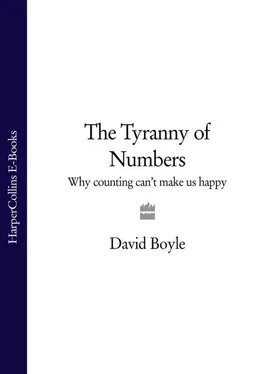The consensus moves backwards and forwards through the centuries, and always with political implications. If numbers are a mysterious aspect of the universe put there by God, we tend to become subject to control and manipulation by accountant-priests. If they are a method by which humanity can control chaos, they become part of the tools of a technocratic scientific elite. The modern world is firmly in the second camp. We have rejected rule by priests in favour of rule by science. Measuring is something humans have invented for themselves, and animals – by definition – can’t hack it. They might be able to spell or pick up astonishingly subtle body language, but it is important for our world view that they can’t count.
The other view – that numbers have meaning in their own right – was represented by the Greek philosopher Pythagoras, in the sixth century BC, who was the great believer in the natural God-given beauty of numbers. For Pythagoras, numbers corresponded to a natural harmony in the universe, as bound up with the music of the spheres as they are with calculations. Music and beauty were underpinned by numbers. The story goes that Pythagoras listened to a blacksmith hammering away and heard the musical notes made by the anvil. He realized that they were generated by different lengths of hammer, and that there were perfect ratios of halves, thirds and quarters which generated perfect chords. They were the secret harmonies generated by the real numbers in nature. Another legend says that he learned about such things from the wisest people among the Egyptians and Phoenicians, and spent 12 years studying with the Magi after being taken captive and imprisoned in Babylon.
Numbers existed even before the universe itself, according to Pythagoras. But even that was too mild for St Augustine of Hippo, who declared that six was such a perfect number that it would be so even if the world didn’t exist at all. ‘We cannot escape the feeling,’ said the mathematician Heinrich Hertz, ‘that these mathematical formulae have an independent existence and an intelligence of their own, that they are wiser than we are, wiser even than their discoverers, that we get more out of them than was originally put into them.’
Numbers rule the universe, said Pythagoras and his followers. Anything less like irrational numbers was ‘unutterable’ and initiates were sworn to secrecy about them. According to his follower Proclos, the first people who mentioned such possibilities all died in a shipwreck. ‘The unutterable and the formless must needs be concealed,’ he said. ‘And those who uncovered and touched this image of life were instantly destroyed and shall remain forever exposed to the play of the eternal waves.’
It was irrational numbers that eventually did for Pythagoras. When his descendants opened up a whole new world of paradoxes, irrationality, bizarre computations, negative numbers, square roots, then nothing ever seemed the same again. And although technocrats might breathe a sigh of relief about this evidence of the modern rationality breaking through, we may also have lost something from that sense of pre-existing perfection.
The tyranny of numbers over life began with the simple counting of things with marks on wood. You find notched reindeer antlers from 15000 BC, well before Britain separated itself from continental Europe. These methods lasted into modern times, and were known in the English medieval treasury as ‘tally sticks’. Tally sticks were finally abandoned by the British civil service as a method of keeping track of public spending as late as 1783. After that, the old ones hung around for a generation or so, piled into the Court of Star Chamber until they needed the room. Someone then had the bright idea of burning them in the furnace that was used to heat the House of Lords. The result was that the furnace set light to the panelling and led to the conflagration in 1834 which burned down the Palace of Westminster, and led to the world-famous monstrosity that we know today, complete with Big Ben and mock Gothic.
A few more of these dangerous items were found during repairs to Westminster Abbey in 1909, and they were put safely into a museum, where they could do less damage.
Notches probably came before language. Prehistoric people probably used words like ‘one’, ‘two’, ‘three’ and ‘many’ for anything more complicated. In fact, sometimes ‘three’ might mean ‘many’. Take the French, for example: ‘trois’ (three) and ‘tres’ (very). Or the Latin: ‘tres’ (three) and ‘trans’ (beyond). A tribe of cave dwellers was discovered in the Philippines in 1972 who couldn’t answer the question ‘How many people are there in your tribe?’ But they could write down a list of all 24. But then counting is a philosophical problem, because you have to categorize. You have to be able to see the similarity in things and their differences, and decide which are important, before you can count them. You have to be able to do Venn diagrams in your head. ‘It must have required many ages to discover that a brace of pheasants and a couple of days were other instances of the number two,’ said the philosopher Bertrand Russell. But once you have grasped that concept, there are so many other categories you have to create before you can count how many people there are in your tribe. Do you count children? Do you count foreigners who happen to live with you? Do you count people who look completely different from everybody else? Counting means definition and control. To count something, you have to name it and define it. It is no coincidence that it was the ancient Sumerian civilization, the first real empire, which developed the idea of writing down numbers for the first time. They had to if they were going to manage an imperial culture of herds, crops and people. Yet any definition you make simply has to be a compromise with the truth. And the easier it is to count, the more the words give way to figures, the more counting simplifies things which are not simple. Because although you can count sheep until you are blue in the face, actually no two sheep are the same.
The old world did not need precision. If Christ’s resurrection was important, it wasn’t terribly vital to know what the actual date was. Instead Europeans used numbers for effect – King Arthur was described as killing tens of thousands in battles all by himself. Modern politicians are the last remaining profession which does this, claiming unwieldy figures which they have achieved personally, and pretending a spurious accuracy by borrowing the language of statistics, when actually they are using the numbers for impact like a medieval chronicler. Nor were the numbers they used much good for calculation. Nowadays Roman numerals only exist for things which powerful people want to look permanent – like television programmes or the US World Series – but which are actually very impermanent indeed.
The new world needed accuracy and simplicity for its commerce. Although they were briefly banned by an edict at Florence in 1229, the new Arabic numbers – brought back from the Middle East by the crusaders – began to be spread by the new mercantile classes. These were the literate and numerate people – with their quill pens tracing the exchange of vast sums – plotting the despatch of fleets for kings, managing the processing of wool with the new counting boards.
And soon everybody was counting with the same precision. King John’s Archbishop of Canterbury, Stephen Langton, had already organized a system of chapters and verses for the Bible, all numbered and meticulously indexed, which by the following century used the new Arabic numerals. Soon the new numbers were being used to measure much more elusive things. By 1245, Gossoin of Metz worked out that if Adam had set off the moment he was created, walking at the rate of 25 miles a day, he would still have to walk for another 713 years if he was going to reach the stars. The great alchemist Roger Bacon, who tried to measure the exact arc of a rainbow from his laboratory above Oxford’s Folly Bridge, calculated shortly afterwards that someone walking 20 miles a day would take 14 years, seven months and just over 29 days to get to the moon.
Читать дальше












